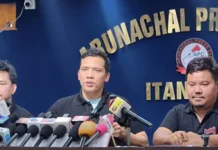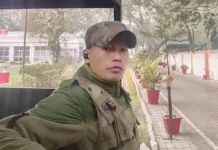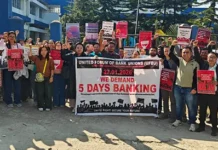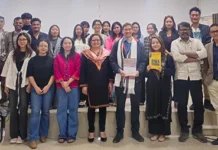[ Nellie N Manpoong ]
ITANAGAR, Dec 24: As the rest of India protests against the injustice on the Muslims and makes the fight against the Citizenship (Amendment) Act (CAA) a religious one, the people of the Northeast, who opposed the act from the time it was first introduced as a bill in 2016, have been sidelined and forgotten even.
The narratives of the Northeast states have been misconstrued, with most people from outside the Northeast terming the protests against the CAA in the Northeast “xenophobic.”
Speaking to this daily from Delhi, activist Dennis Lallienzuol informed how the mainstream media have not given them any voice or space.
“Our narratives, our histories, our cultures are different. Instead of highlighting those issues, we are being drowned in the Hindu-Muslim discord, and it feels wrong. The mainstream media has sidelined our issues, our indigenous identities, and the uniqueness of our issue. The mainland Indians, including progressive liberals, are portraying us as xenophobic. No, we are not xenophobic. They do not understand our social, cultural and identity history,” Lallienzuol said.
Informing that only a few from the mainstream media are picking up the voices from the Northeast, Lallienzuol said that the narratives of the Northeast are being misinterpreted by most.
“This is the marginalization that the protestors from the Northeast have faced in the past few weeks – not including the continuous history of marginalization and discrimination. This has especially caused anger and frustration among the young people from the NE,” he said, adding that “it is no longer about the Hindu-Muslim discord, or the CAA or the NRC; it is much beyond that. There is a feeling of our issues and concerns being hijacked, of being misrepresented. We want to be heard.”
Affirming that the Northeast does have an issue with the CAA, he, however, pointed out that the issue “is beyond that now.”
“It’s painful when people say that the capital of Tripura is Imphal, or that the capital of Aizawl is Guwahati. Without basic knowledge about the Northeast, the mainstream media comments on what is going on in Assam and Tripura and they try to justify it,” Lallienzuol said.
A native of Manipur, Lallienzuol also called out on the inner line permit (ILP) system extended to Manipur.
“Giving ILPs is like giving lollypops to the people to keep their mouths shut for some time. What happens after the lollypops are over? Have people thought about that?” he said.
Saying that people need to understand how the ILP works, he termed the ILP a “short-term solution of the government.”
Tying this to the implementation of the uniform civil code (as mentioned in the BJP’s manifesto), Lallienzuol said, “The abrogation of Article 370 was on the premise of ‘one nation, one law’. Giving the ILP to certain states and implementing the uniform civil code is contradictory in nature,” he said.
Calling on the people to demand a permanent solution, Lallienzuol said, “If Jammu & Kashmir’s special status was struck off on the premise of ‘one nation, one law’, can the ILP prevent the same? The government can do anything. Can we trust the government at this point of time? That is what the people really need to decide.”
“We need to find a solution that is going to protect us more. Not in a way that makes us xenophobic, but in a way that preserves our rights as minorities, as indigenous people, and as citizens protected under the realm of the nation,” he said.
Lallienzuol also condemned the police brutality across the country, and said that the detention of Akhil Gogoi and other activists from the Northeast and other parts of India during the protests is disappointing.
On 23 December, hundreds of people from the Northeast residing in New Delhi staged a protest near the Assam Bhavan there, but were taken to the Mandir Marg police station in Chanakyapuri.
Reportedly, people who had arrived early were picked up by the police as soon as they arrived at the Assam Bhavan. Only a few, who arrived late, were able to stage a small protest before being taken away by the police.





